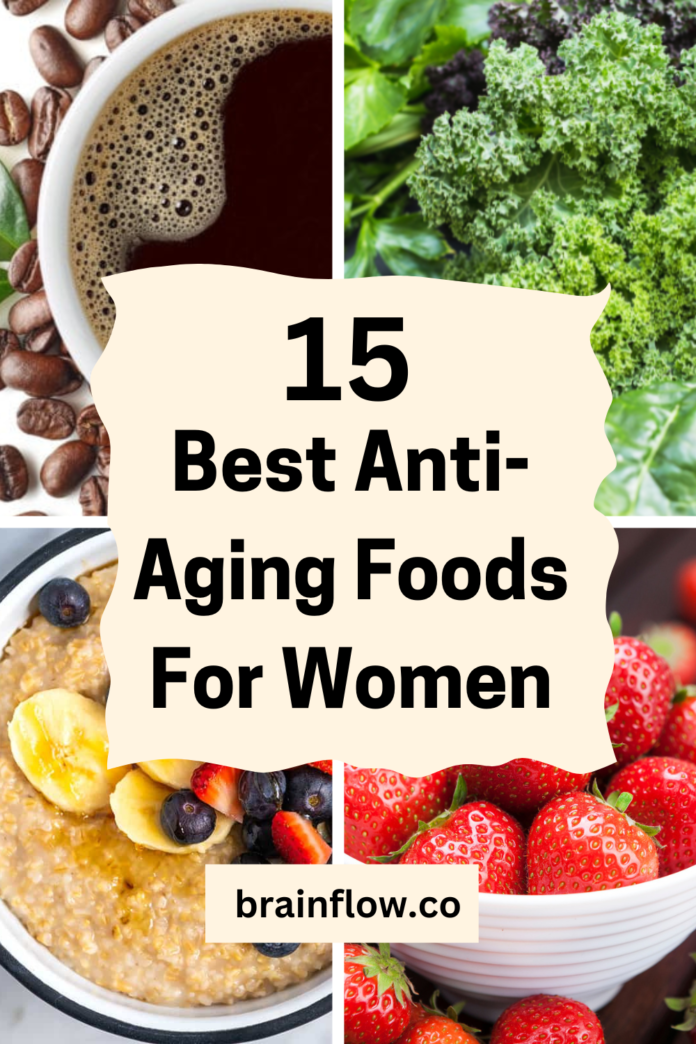Aging is a natural process, but who says we can’t age gracefully? As I delve into the world of nutrition, I’ve discovered that what we eat plays a significant role in how we look and feel as the years go by. It’s fascinating to see how certain foods can help keep our skin radiant, our minds sharp, and our bodies energetic.
Take blueberries, for instance. Studies show that just a handful a day can reduce the risk of type 2 diabetes and lower blood pressure. Green leafy vegetables are another powerhouse; people who consume them regularly have brains that appear up to 11 years younger and a 16% lower risk of heart attacks. Imagine adding these and other anti-aging foods to your diet and reaping the benefits of a youthful glow and vibrant health. Let’s explore the 15 best anti-aging foods for women that can make a real difference.
1. Olive Oil

Olive oil stands out as a powerful anti-aging food. It’s rich in monounsaturated fats (MUFAs), comprising about 73% of its total fat content. MUFAs offer strong anti-inflammatory effects, which contribute to reducing skin aging.
Studies have shown that a diet high in MUFAs can reduce the risk of severe skin aging. For example, a 2012 study found that individuals consuming olive oil-rich diets had a lower risk of serious skin aging issues. The anti-inflammatory properties of both MUFAs and the antioxidants in olive oil, such as tocopherols and beta carotene, are thought to be responsible for these effects.
Antioxidants play a crucial role in protecting the skin from damage. Olive oil contains antioxidants like phenolic compounds, which combat inflammation and help maintain youthful skin. These compounds work by neutralizing free radicals, preventing them from causing cellular damage.
Besides its role in skincare, olive oil improves overall health. It’s linked to a lower risk of heart disease and can help manage blood pressure. Research supports that the polyphenols in olive oil provide these protective benefits.
Including olive oil in your diet is simple. Use it as a salad dressing, drizzle it over vegetables, or incorporate it into cooking. Its versatility and health benefits make it an essential part of any anti-aging regimen.
- Rich in MUFAs: Helps reduce skin aging and inflammation.
- High in Antioxidants: Protects against cellular damage.
- Versatile in Use: Easy to include in various dishes.
- Heart Health: Reduces the risk of heart disease and manages blood pressure.
By making olive oil a regular part of your diet, you can reap its anti-aging benefits and support overall well-being.
RELATED READING: 7 Most Powerful Supplements for Anti-Aging
2. Red Wine

Red wine stands out as a notable anti-aging beverage due to its rich resveratrol content. Resveratrol, a powerful antioxidant found in the skin of red grapes, activates sirtuins proteins that help reduce the effects of aging. These proteins, specifically SIRT1, protect the body against cellular damage. If you would like to get resveratrol without drinking alcohol like myself, you can get resveratrol in supplement form from my favorite supplement company Renue By Science. Use code ‘brainflow’ for 10% off your order!
Red wine also offers polyphenolic flavonoids, which combat UV radiation and pathogen stress. Such components are crucial for maintaining skin health and elasticity. Examples of grape varieties rich in resveratrol include Muscat, Malbec, Pinot Noir, and Syrah. Wines made from these grapes provide higher concentrations of beneficial compounds.
To maximize benefits, choose red wines from cool, moist regions as they typically contain higher resveratrol levels. However, it’s essential to consume red wine in moderation. One should ideally not exceed 5 fluid ounces per day to safely enjoy its anti-aging properties without adverse effects.
While some experts argue that red wine’s health benefits might be overstated, others suggest alternative sources of antioxidants. Blueberries, cranberries, and peanuts also offer resveratrol. Despite this debate, moderate red wine consumption may still be a valuable part of an anti-aging diet.
In addition to its anti-aging qualities, red wine can also reduce risks associated with heart disease, diabetes, and hypertension. Its potent antioxidants contribute significantly to overall health and longevity, making it a well-rounded choice for women looking to maintain youthful vitality.
RELATED READING: Harvard Scientist David Sinclair Reveals His Anti-Aging Supplement Stack
3. Yogurt
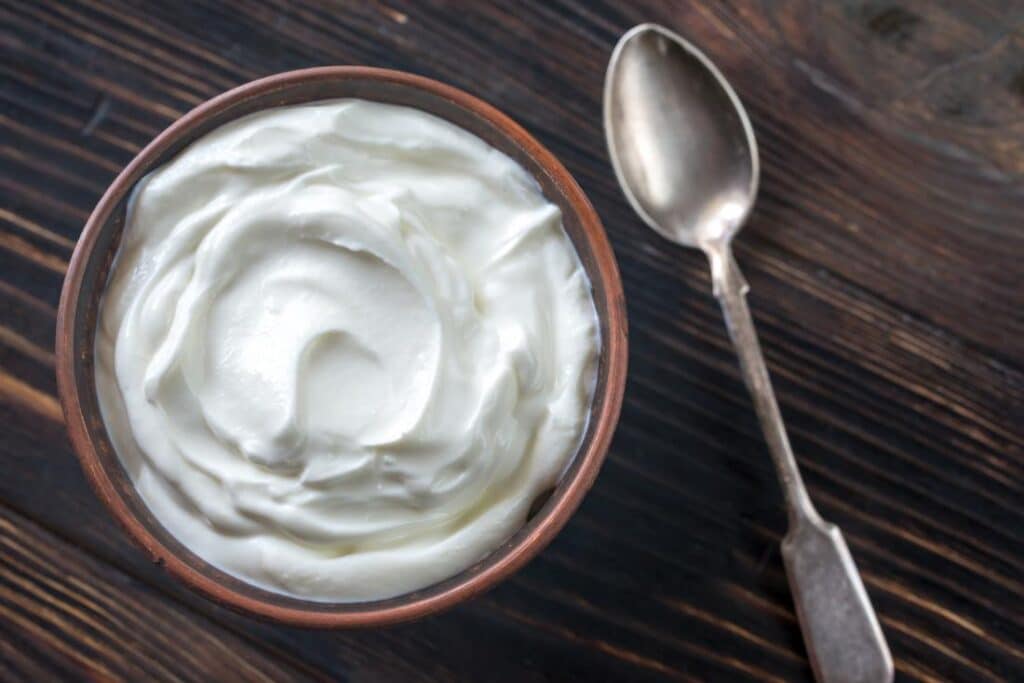
Yogurt is an excellent anti-aging food due to its rich calcium content, which helps stave off osteoporosis. This benefit is particularly crucial for women as they age. Yoghurt also contains probiotics, which help maintain gut health and diminish age-related intestinal illnesses. By promoting a healthy digestive system, yogurt can enhance overall well-being.
In addition to its digestive benefits, yogurt can smooth skin and soothe the stomach. Some studies suggest that consuming yogurt regularly could help lower blood pressure. This dairy product’s versatility means it can be enjoyed in various forms, making it easy to incorporate into daily diets.
Furthermore, the probiotics in yogurt support the skin’s microbiome, contributing to a more youthful complexion. With its potential to keep the skin hydrated and reduce inflammation, yogurt can be a valuable addition to a skincare regimen. For instance, eating yogurt with live cultures can help balance skin flora, leading to fewer acne flare-ups and improved skin texture.
Incorporating yogurt into meals or snacks is straightforward. Some popular options include adding it to smoothies, using it as a base for salad dressings, or having it as a standalone snack with fruits or honey. These combinations not only enhance the flavor but also amplify the health benefits.
Yoghurt’s comprehensive health benefits make it a standout among anti-aging foods. By supporting bone health, digestive wellness, and skin care, it offers women an easy and delicious way to enhance their diets and promote graceful aging.
RELATED READING: 7 Longevity Benefits of NMN: Boost Energy, Repair Cells, and More
4. Fatty Fish
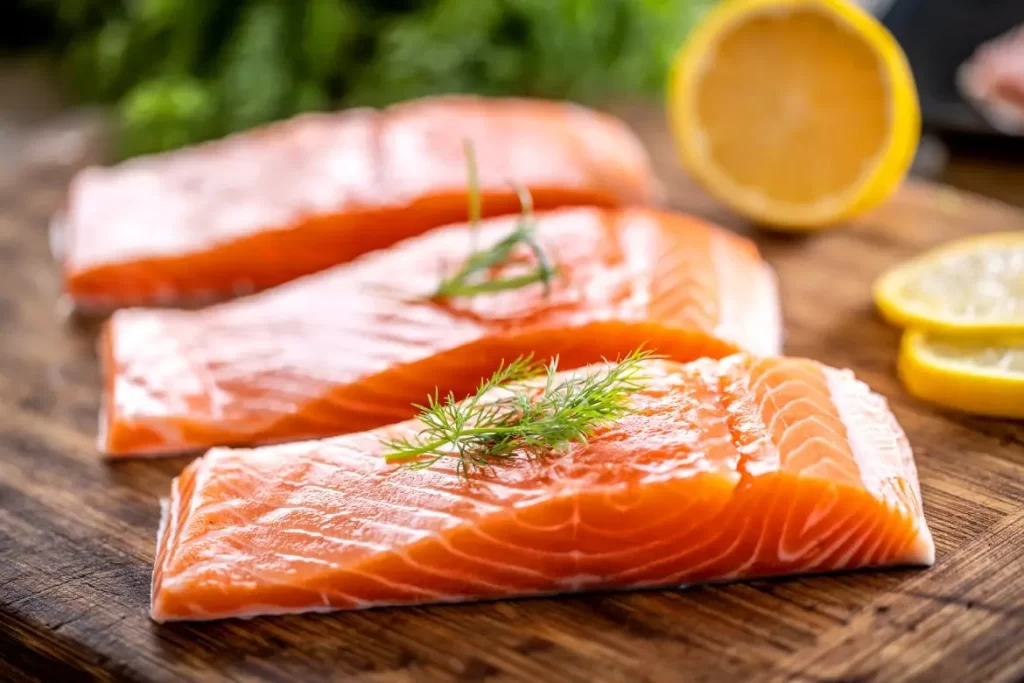
Fish, particularly fatty fish like salmon, offer substantial anti-aging benefits. It’s packed with omega-3 fatty acids, which contribute to keeping skin moisturized and reducing inflammation. Studies show that people incorporating fatty fish into their diets often experience fewer signs of aging, such as wrinkles and dryness.
Salmon contains astaxanthin, a carotenoid antioxidant responsible for its pink color. Astaxanthin has been linked to improvements in skin elasticity and hydration. According to a study, participants with sun-damaged skin who consumed astaxanthin and collagen for 12 weeks observed significant enhancements in skin elasticity and hydration. However, it’s unclear if these benefits stem from astaxanthin, collagen, or a combination of both.
Besides omega-3 and astaxanthin, fish is high in protein, crucial for collagen and elastin production. Collagen and elastin are proteins vital for maintaining skin strength, plumpness, and elasticity, preventing sagging, and promoting a youthful appearance. Protein in fish also aids wound healing, keeping skin healthy and resilient.
Fish like salmon is also a rich source of selenium. Selenium is an antioxidant and mineral that supports DNA synthesis and repair, protecting skin from UV damage. Adequate selenium levels may reduce the severity of skin conditions like psoriasis.
Incorporating fish, especially salmon, into the diet offers multiple anti-aging advantages due to its nutrients like omega-3 fatty acids, astaxanthin, protein, and selenium. These components together help maintain healthier, more youthful skin.
RELATED READING: 7 Powerful Anti-Aging Benefits of Berberine
5. Cocoa
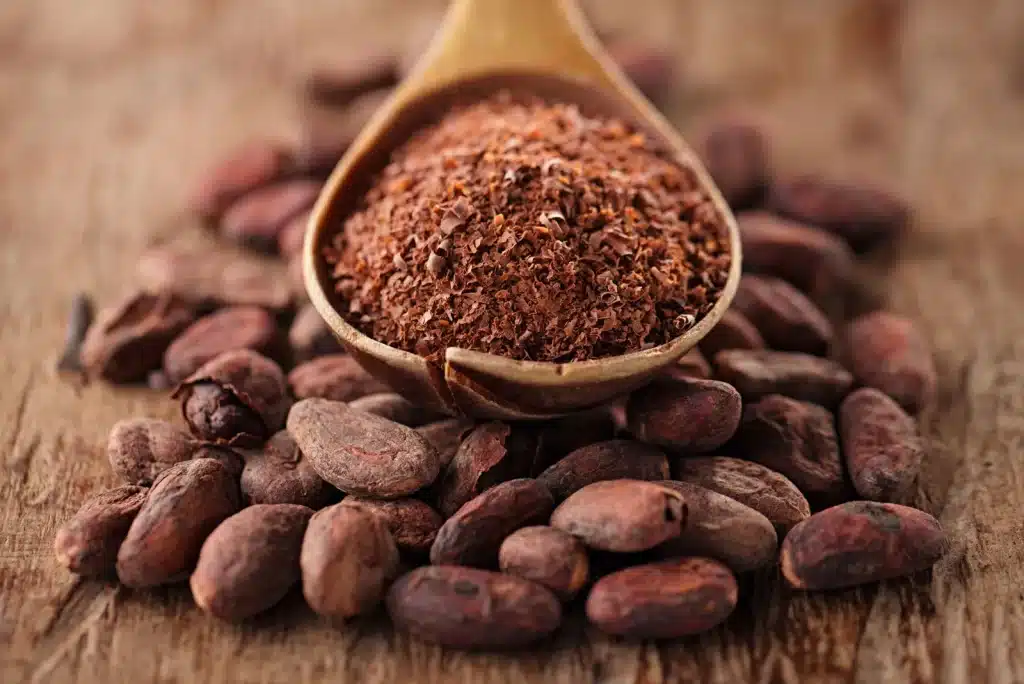
Including cocoa in your diet offers several anti-aging benefits, particularly for skin health. Cocoa contains potent antioxidants known as flavanols, which could protect the skin from sun damage and improve its overall appearance. A high-quality 24-week study found that participants who consumed a flavanol-rich cocoa beverage experienced significant improvements in skin elasticity and facial wrinkles.
Flavanols enhance blood flow to the skin, which aids in nourishment and improves skin moisture. To maximize these benefits, choose dark chocolate varieties with at least 70% cocoa solids—higher cocoa content equates to more flavanols.
While results from various studies are mixed, the potential skin benefits of dark chocolate consumption are promising. It’s crucial to avoid chocolates with high added sugar content, as excessive sugar can counteract the positive effects of flavanols.
Apart from skin benefits, cocoa supports overall health. Consumption in moderation might help maintain cardiovascular health by improving blood flow and lowering blood pressure. It’s a delicious way to incorporate antioxidants into your diet that promote healthy, youthful skin.
RELATED READING: We Ranked the 5 Best Skincare Products for Women
6. Oats
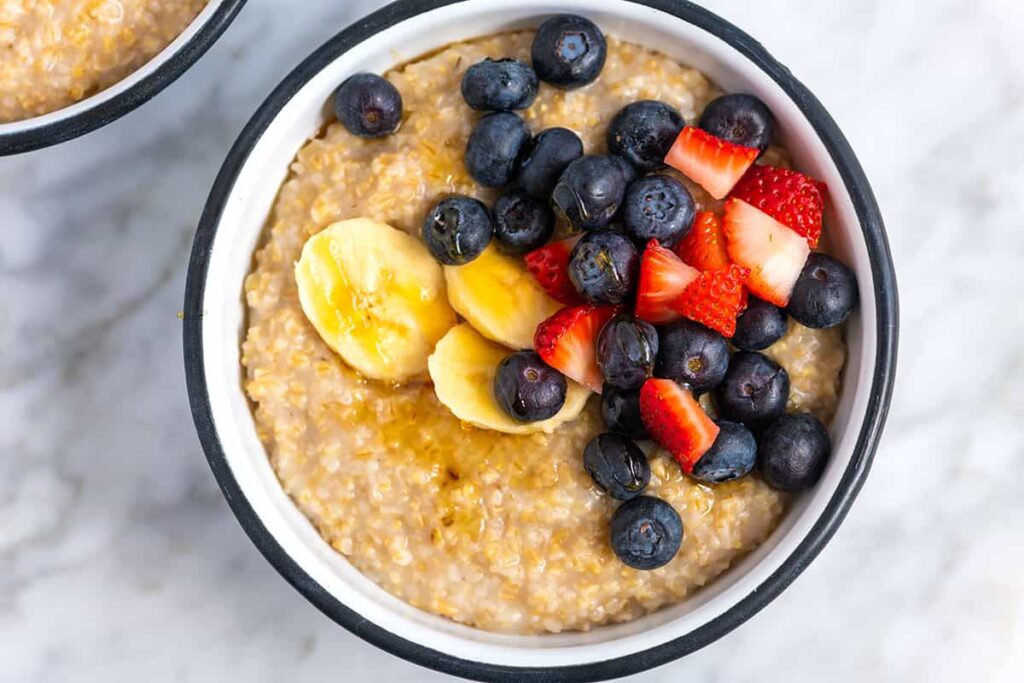
Oats, loaded with dietary fiber and beta-glucans, stand out as a top anti-aging food. Unlike refined breads, rice, and pasta, oats don’t spike blood sugar levels. This makes them ideal for maintaining steady energy throughout the day and reducing the risk of type 2 diabetes.
The high fiber content in oats helps lower cholesterol. This is crucial for heart health, a key concern as we age. Studies show a diet rich in oats can significantly improve cardiovascular health by reducing LDL cholesterol.
Beta-glucans in oats are also known for their immune-boosting properties. These compounds enhance the body’s defense mechanisms and help reduce inflammation. Chronic inflammation is a major contributor to aging and age-related diseases.
Oats benefit the skin as well. They help reduce inflammation, which makes the skin look younger. Moreover, oats can improve skin hydration and combat dryness, leaving the skin smooth and supple.
For those with weight management goals, oats are a great option. They provide a sense of fullness and help control appetite. With excess weight linked to numerous health issues, incorporating oats into the diet can aid in longevity.
Porridge, made from rolled oats, offers a versatile breakfast option. It can be a base for other anti-aging foods like nuts, berries, and flax seeds, enhancing nutritional intake.
Oats are easy to integrate into the daily diet. Whether in the form of porridge, overnight oats, or added to smoothies, they provide substantial health benefits. For optimal results, choose plain, unflavored oats without added sugars or artificial ingredients.
Incorporating oats into my diet consistently has helped me feel more energetic and maintain better overall health. It’s a simple yet effective change that can have a profound impact on aging gracefully.
7. Nuts
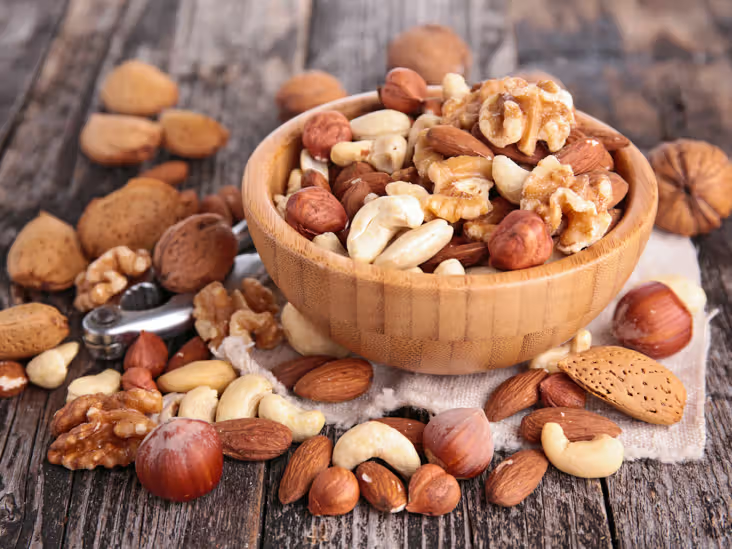
Nuts are an essential part of the Mediterranean diet and a top anti-aging food. They include peanuts, pistachios, almonds, walnuts, cashews, hazelnuts, and Brazil nuts. These nuts contain phytosterols, antioxidants, minerals, vitamins, fiber, protein, and healthy fats.
Despite being high in calories, moderate consumption of nuts doesn’t cause weight gain. In fact, studies show that even people with type 2 diabetes can benefit from eating almonds. These nuts lower blood glucose levels and improve satiety. According to a study published on PubMed, nuts help lower bad cholesterol, enhance cognitive health, improve good cholesterol, reduce cancer risks, and fight inflammation. This optimizes organ functions and skin health.
Eating nuts as part of a balanced diet can add years to your life by preventing chronic diseases like cancer, cardiovascular disease, and cognitive decline. Nuts contain both monounsaturated and polyunsaturated fats, which have been linked to lower heart disease and type 2 diabetes risks. Because vascular factors are connected to cognition, nuts may slow cognitive decline in older adults.
Some of the best nuts for anti-aging are chestnuts, walnuts, and pecans. Chestnuts are particularly beneficial due to their nutrient density. Pecans are rich in antioxidants. Walnuts, known for their high omega-3 content, support brain health and reduce inflammation.
If you want glowing skin, include nuts in your daily diet. Pumpkin and sunflower seeds are high in vitamin E, which benefits skin health. Almonds help reduce inflammation, preventing premature aging. Walnuts make an excellent snack option.
Incorporating a variety of nuts into your diet provides essential nutrients and supports overall health, making them a crucial addition to any anti-aging regimen.
8. Oranges

Oranges are loaded with water, making them excellent for hydrating skin and cells. These fruits are an outstanding source of vitamin C, which is crucial for collagen production. Collagen helps keep skin supple and firm by improving its structural integrity.
Oranges contain more than 170 different phytochemicals and over 60 flavonoids. These compounds offer various health benefits, including anti-inflammatory and antioxidant properties. By reducing inflammation, oranges help combat signs of aging and maintain skin health.
Rich in fiber, oranges aid in digestion and promote overall gut health. A healthy gut can improve nutrient absorption and have a positive impact on skin appearance. The natural sugars in oranges provide a quick energy boost without causing a spike in blood sugar levels, making them an ideal mid-day snack.
Incorporating oranges regularly into my diet has enhanced my skin’s elasticity and overall glow. Whether consumed as a snack, in salads, or as fresh juice, the consistent intake of this vitamin-packed fruit can offer significant anti-aging benefits.
9. Blueberries
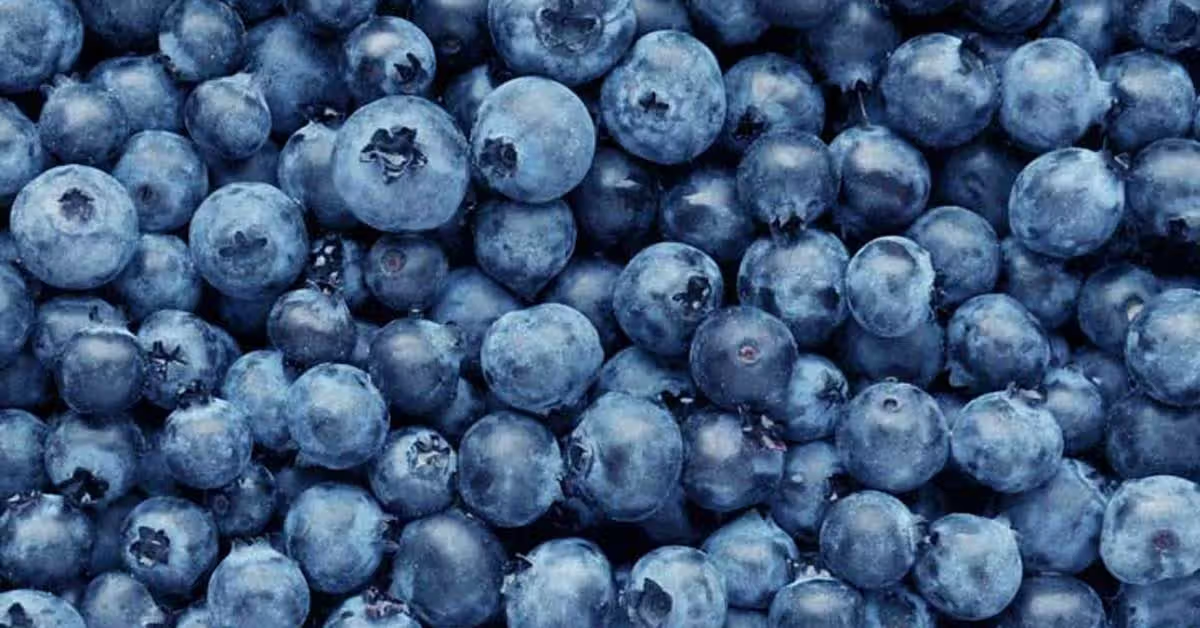
Blueberries rank high among the best anti-aging foods for women. Rich in antioxidants and packed with vitamins, these small fruits offer significant health benefits. Research shows that adding blueberries to your diet can reduce the risk of heart attacks and lower blood pressure, supporting cardiovascular health.
Cardiovascular Benefits
Studies involving animal subjects reveal that a blueberry-enriched diet significantly reduces the incidence of cardiovascular disease. For humans, one study with over 120,000 participants indicated that consuming a handful of blueberries daily cuts the risk of type 2 diabetes. This makes blueberries a powerful addition to heart-healthy diets.
DNA Protection
Blueberries provide excellent protection for DNA against damage, even from strong cosmic radiation. NASA has even studied blueberry intake to safeguard astronaut DNA from such extreme conditions. Including blueberries in your diet ensures that your DNA stays protected, reducing the chances of mutations and related issues.
Skin Health and Anti-aging
Blueberries also offer anti-aging benefits for the skin. The skin of blueberries contains anthocyanins, powerful antioxidants that combat signs of aging by lowering inflammation and oxidative stress. Whether fresh, frozen, or freeze-dried, blueberries keep your skin healthy and vibrant. Including other berries like strawberries and raspberries can intensify these skin health benefits.
Cognitive Health
Polyphenols in blueberries help prevent Alzheimer’s disease and memory loss. Studies back this claim, showing the effectiveness of polyphenols in keeping cognitive functions robust with age. Consuming blueberries consistently benefits both mental clarity and memory.
Versatility
Blueberries are versatile and can be easily incorporated into various dishes. Add them to cereals, smoothies, or salads. This ease of use makes it simpler to incorporate them into your daily diet, ensuring you reap all their anti-aging benefits.
10. Avocados

Avocados are rich in healthy fats that benefit your skin. Studies done by nutritionists show that people eating foods high in monounsaturated fats, like avocados, tend to experience less skin aging. Avocados contain zeaxanthin and lutein, compounds that maintain eye health and lower the risk of macular degeneration. These properties make avocados a powerful addition to any anti-aging diet.
You can enjoy avocados in several ways. Add them to smoothies, sandwiches, and salads. Avocado toast is a popular option, providing a delicious and nutritious way to incorporate this fruit into your daily meals. Considering their versatility, avocados are easy to include in any diet plan.
Here’s a quick table outlining the key benefits of avocados:
| Component | Benefit |
|---|---|
| Monounsaturated Fats | Reduces skin aging |
| Zeaxanthin & Lutein | Supports eye health, lowers macular degeneration risk |
Avocados also offer additional nutritional benefits. They contain vitamins E and C, which are powerful antioxidants that protect skin cells from damage. One avocado provides 15% of the daily value for vitamin E and 17% for vitamin C in optimal health diets.
Eating avocados can help maintain a youthful appearance. The fats in avocados keep your skin hydrated and soft. This leads to a smoother complexion and reduced appearance of wrinkles.
In light of their significant health benefits, avocados should be a regular part of any anti-aging regimen. From promoting skin health to supporting eye function, avocados offer a multifaceted approach to aging gracefully.
11. Strawberries
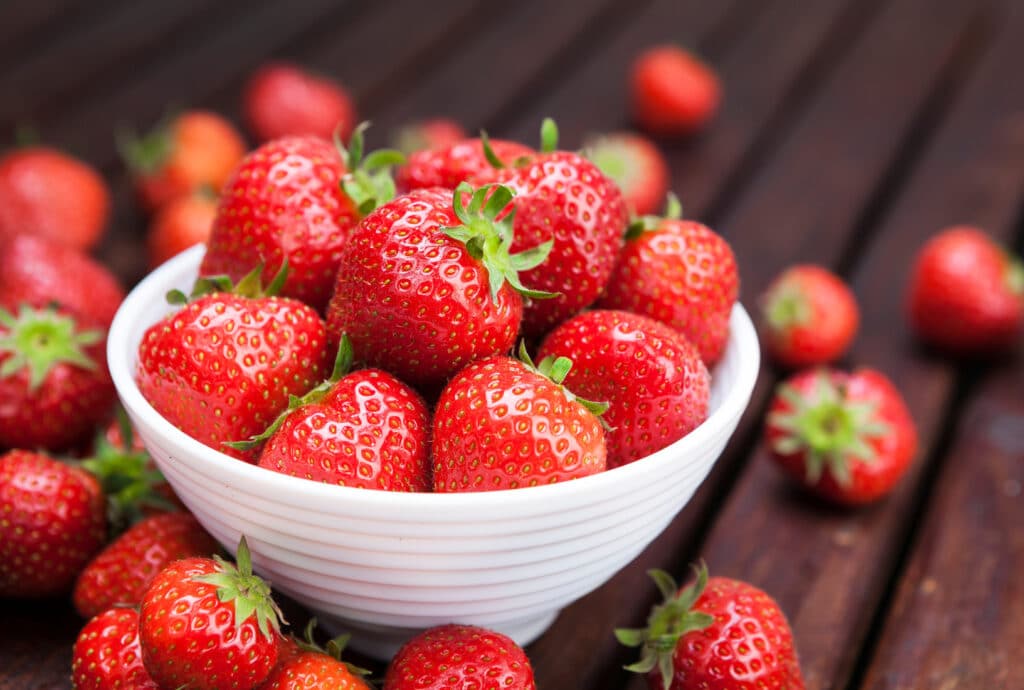
Strawberries are rich in antioxidants, making them an excellent choice for combating the signs of aging. They contain a variety of nutrients essential for reducing damage caused by free radicals, which our bodies encounter daily. By incorporating strawberries into my diet, I get the benefit of antioxidants that support skin health and vitality.
Strawberries pair perfectly with a wide range of breakfast options. Whether I’m enjoying waffles, pancakes, or oatmeal, adding strawberries elevates my meal and delivers essential nutrients. Their high vitamin C content helps boost collagen production, which is vital for maintaining skin elasticity and reducing wrinkles.
Strawberries are also beneficial for overall health beyond their anti-aging properties. They can help in reducing inflammation and oxidative stress. Free radicals are unstable molecules that can accelerate aging, and antioxidants like those found in strawberries neutralize these molecules. Regular consumption of strawberries aids in maintaining a healthier, more youthful complexion.
In terms of versatility, strawberries are unmatched. Whether fresh, frozen, or in smoothies, their unique properties remain intact. They are not only tasty but also a practical addition to my diet, enhancing both flavor and nutritional value. The antioxidants in strawberries include anthocyanins, which help lower inflammation – another factor in aging.
Incorporating strawberries into my diet offers a delicious and effective way to combat aging. By adding them to various meals, I make use of their full nutritional profile to keep my skin looking youthful and radiant.
12. Coffee

Coffee, enjoyed in moderation, offers significant anti-aging benefits. Consuming 3 to 5 cups per day can help reduce the risk of Alzheimer’s, Parkinson’s, type 2 diabetes, heart disease, and various cancers. Coffee achieves these effects through several mechanisms, including reducing inflammation, particularly age-related inflammation known as inflammaging.
Specific components in coffee, like caffeine, play a critical role in mitigating age-related health issues. Caffeine’s anti-amyloidogenic activity can slow down the protein clumping process, which contributes to aging. According to a study by Stanford University, caffeine may counteract age-related inflammation, thus offering protective benefits.
Despite these advantages, coffee does have potential drawbacks. For instance, an increased risk of osteoporosis is associated with excessive consumption. However, considering the overall body of research, moderate coffee intake offers far more benefits than disadvantages.
Benefits of Coffee for Anti-Aging
- Reduction in Neurodegenerative Diseases: Regular coffee consumption can lower the risk of Alzheimer’s and Parkinson’s diseases.
- Anti-Inflammatory Effects: Coffee helps combat inflammaging, reducing age-related inflammation.
- Chronic Disease Prevention: Consistent, moderate coffee intake is linked to a reduced risk of type 2 diabetes, heart disease, and certain cancers.
- Protein Clumping Slowdown: Caffeine’s anti-amyloidogenic activity helps slow down the protein clumping process, playing a role in aging.
- Moderation: Stick to 3 to 5 cups per day to maximize benefits.
- Potential Side Effects: Be aware of the increased risk of osteoporosis with high consumption.
From a health perspective, coffee stands out as a valuable addition to an anti-aging diet when consumed in moderation. Combining it with other anti-aging foods like avocados and strawberries enhances its overall benefits.
13. Tomatoes
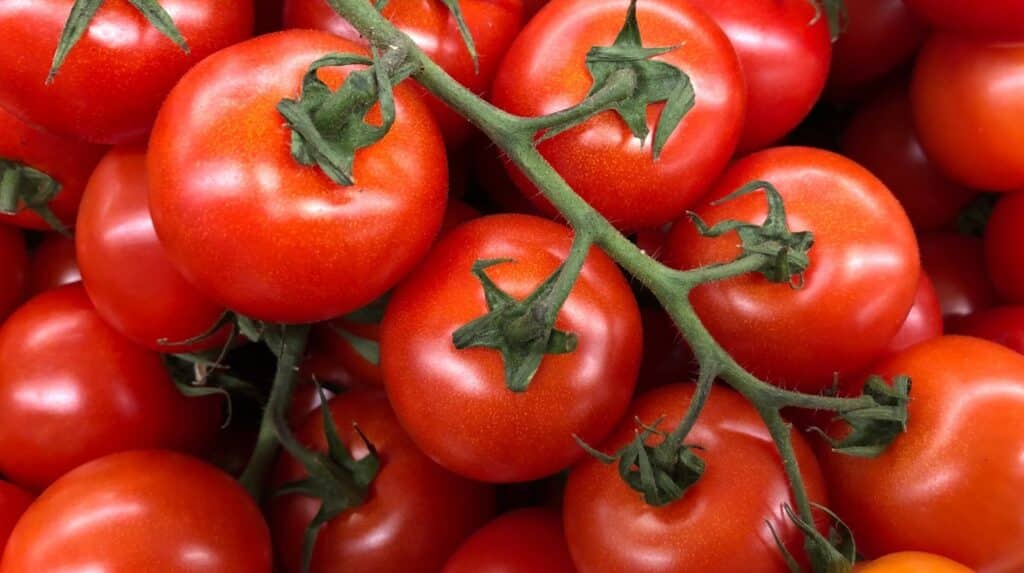
Tomatoes rank high on the list of anti-aging foods thanks to their rich nutrient profile. Not only are they versatile in various recipes, but they also pack potent antioxidants like lycopene, which supports skin health by fighting free radicals. This helps reduce the appearance of wrinkles and fine lines.
Incorporating tomatoes into your diet offers additional benefits due to their vitamin C and potassium content. Vitamin C aids collagen production, which is crucial for maintaining skin elasticity. Potassium helps in hydrating skin cells, giving you that youthful glow. Whether you prefer tomatoes in salads, soups, or sauces, their anti-aging properties remain effective.
Scientific studies show that diets rich in tomatoes can help lower the risk of certain chronic diseases, including heart diseases and cancers. This makes tomatoes not only a beauty-enhancing food but also a health-boosting one. The carotenoids in tomatoes, like beta-carotene and lutein, further protect the skin from UV damage, another major aging factor.
Eating fresh tomatoes or using tomato-based products like paste and juice can equally contribute to these benefits. However, if you have sensitivities, it’s essential to consult a healthcare professional before adding significant quantities to your diet. Tomatoes, packed with essential nutrients and antioxidants, serve as an excellent addition to any anti-aging regimen you adopt.
14. Tofu
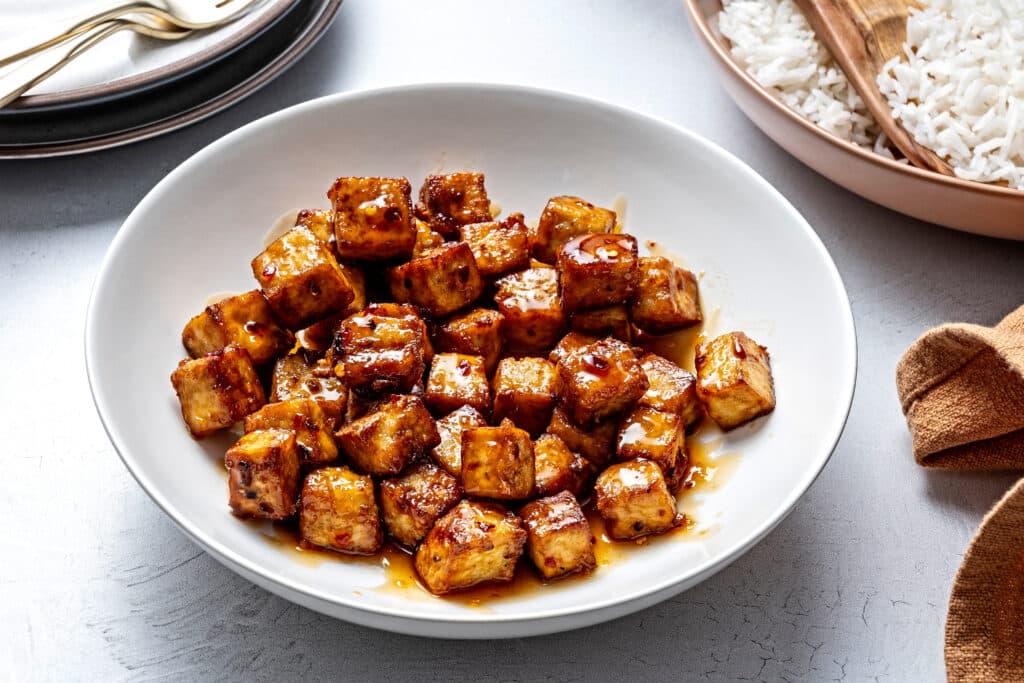
Tofu, a versatile and high-protein food, holds significant anti-aging benefits attributed to its rich nutrient content. High in protein, tofu provides essential amino acids crucial for maintaining muscle mass and skin elasticity. Consuming tofu regularly helps support collagen production, a key factor in reducing wrinkles and keeping skin firm.
Tofu is also a source of isoflavones, which mimic estrogen in the body. For women, especially post-menopausal, consuming isoflavone-rich foods like tofu can aid in maintaining skin thickness and moisture levels. Studies suggest that these isoflavones help diminish the appearance of fine lines and wrinkles by improving skin elasticity.
In addition to protein and isoflavones, tofu contains vitamins and minerals beneficial for the skin. It’s rich in iron, calcium, and magnesium, which support overall skin health. Iron aids in oxygen transport, promoting a healthy complexion, while calcium contributes to skin’s barrier function and hydration levels.
Eating tofu doesn’t just benefit the skin; it’s also good for heart health. It contains no cholesterol and is low in saturated fats, making it a heart-healthy protein source. For those seeking to integrate tofu into their diet, options include tofu stir-fries, salads, soups, and smoothies.
Pairing tofu with other protein-rich foods like chicken, fish, and eggs further enhances its benefits. A diet combining various protein sources and rich in fruits and vegetables ensures diverse nutrient intake, supporting healthier, younger-looking skin.
To maximize the anti-aging benefits of tofu, combine it with a balanced diet and an active lifestyle. This multifaceted approach can help maintain youthful skin and overall well-being.
15. Leafy Greens

Incorporating these 15 anti-aging foods into your diet can make a significant difference in how you look and feel. From the skin-boosting benefits of avocados and strawberries to the heart-healthy properties of tofu and fatty fish, each of these foods offers unique advantages. Don’t underestimate the power of a balanced diet rich in antioxidants, vitamins, and healthy fats. Remember, it’s not just about adding these foods to your meals but also maintaining an active lifestyle and staying hydrated. By making mindful choices, you’re investing in your long-term health and well-being.

